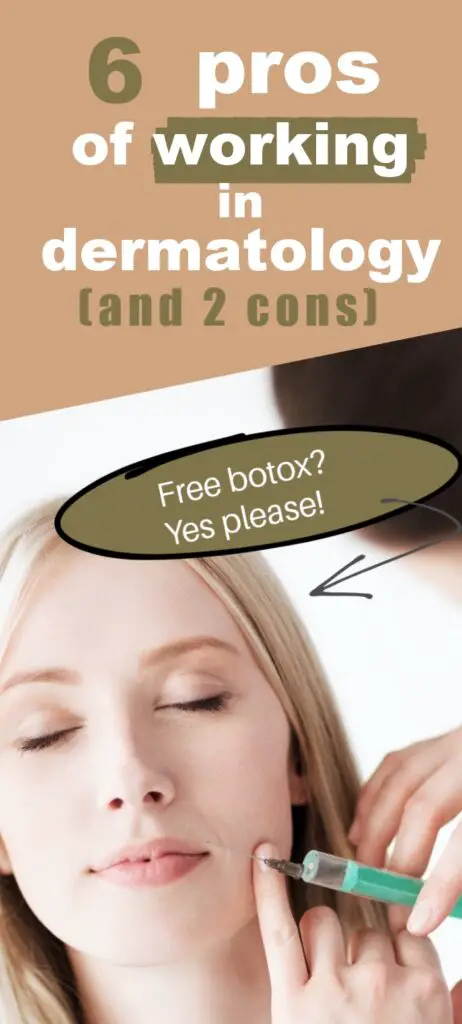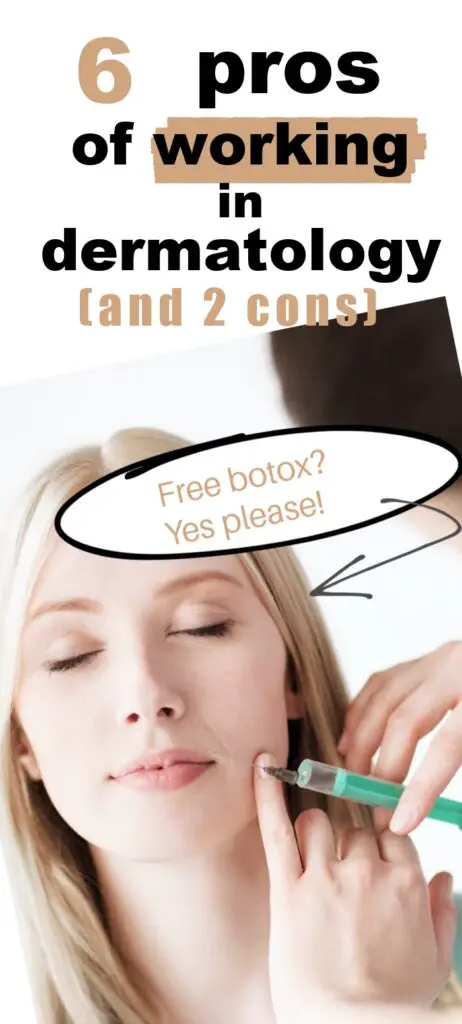If you are anything like me then you grew up making pro and con lists for big life decisions. I’m not going to lie, I made them for pretty much everything. After completing my lists, I would tally up the number of pros and the number of cons and quite frankly that would be how I made my decisions. Today the number doesn’t matter as much as the quality of the pro or the con. In the end, these lists slowly led me to where I am today. In this post, I am going to outline the pros and cons of working in dermatology as a PA so you can determine if the specialty may be a good fit for you. Spoiler alert, there are more pros on this list than cons.
Pros of working in dermatology
You can treat patients of all ages
This is so rewarding! When I was contemplating specialties I really didn’t want to only work with one age group. I love pediatric dermatology and I also love my geriatric patients. I have seen a patient as young as 1 week old and as old as 106!! A lot of other specialties do not have this privilege.
Work-life balance
This one is huge and has proven to be a predictor of happiness! No call? check! 9-5? check! Holidays off? Check! At first, I loved the idea of working 12-hour shifts and having long weekends. I quickly realized after my first three night shifts in a row during my emergency medicine rotation that it wasn’t for me. My sleep is extremely important to me and I realized how much I value structure in my days and weeks. I knew that if I chose a hospital job, for the first few years at least I would be likely required to take undesirable shifts. Also, the hospital doesn’t close on holidays but most out-patient offices do.
Procedural and non-procedural work
I love that while sometimes my work can become monotonous it does vary from patient to patient. I wanted to work in a medical specialty where I was able to use my hands and actually physically fix people. While I don’t perform complex surgeries, I do perform minor procedures such as electrodesiccation and curettage (ED&C). This is a non-invasive procedure that can be used to treat superficial non-melanoma skin cancers. (If you are interested in learning more about the different types of skin cancers, you can read about them here.) There is something to be said when you are able to remove someone’s skin cancer with your own bare hands (and tools).
I may be performing an ED&C on one patient’s superficial basal cell carcinoma, and then my next patient may be a follow-up on a rash where all we are really doing is talking. I love psychiatry (I have a bachelor’s degree in it) but I personally couldn’t imagine only talking day after day without being able to perform procedures. The same goes for the opposite end of the spectrum. I don’t think I would enjoy working in surgery full-time. Knowing myself, I would get tired of standing for hours at a time and not being able to speak to my patient. Sometimes I just want to sit and chat. In my opinion, dermatology is the best of both worlds.
Pay
A lot of people want to know about this one. Dermatology is one of the more lucrative specialties in medicine. This is because we perform a lot of cosmetic procedures which are out of pocket and do not go through insurance, so the cash flow is higher. You can negotiate a salary based on a straight percentage of collections. This means you can receive a certain percentage of the revenue you bring into the office. This contract style is beneficial for both you and your employer because the harder you work the more revenue you bring into the practice. While PAs in other specialties can also work on this salary structure, the revenue brought in by a dermatology PA is typically higher due to cosmetics and surgical procedures.
Patients aren’t dying
I know this statement is a little odd, but it is true. You are likely not going to be responsible if a patient lives or not. Occasionally, you’ll find an invasive melanoma and have to break bad news, but even then rarely is it ever a conversation of you have x to x months to live. Actually I, fortunately, have never had that conversation.
Patients are motivated to follow your treatment regimen
When a rash is unbearably itchy and keeping someone up at night, or acne is causing embarrassment at school, you better believe the patient is likely going to do anything you say. Meanwhile, you can imagine how difficult it can be to treat a patient who needs to quits smoking and lose weight because in the future they *may* develop XYZ conditions. Since a patient is not going to see immediate results or gratification they are less likely to follow through even if you are the very best at your job. Visual improvement in skin conditions is always rewarding for both you and the patient, and the reason why I strongly believe in taking before and after photos.
Cons of working in dermatology
It is fast-paced
Okay okay… So this can be both a pro and a con. I prefer fast-paced environments. It makes my work day go by quickly. I rarely ever catch myself looking at the clock to see what time it is. For some people, this may be a con. You have to be really good at time management or else you are going to easily fall behind and be late for your patients. On average, I see anywhere between 30-35 patients a day. If you want to do the math, that is 4-5 patients an hour for a seven-hour workday. After a few more years that number will likely increase. Some dermatologists I know will see 60+ patients a day.
Losing knowledge of general medicine
While you are in PA school, people will tell you that you should go into primary care prior to specializing, or else you will lose all of your knowledge of general medicine. This is partially true. Over two years in, I wouldn’t say I have “lost” my knowledge of general medicine but it definitely isn’t as sharp as it would have been if I was working in the family or internal medicine. I stand by my decision to specialize right out of school. I believe my knowledge of dermatology has been able to grow at a much faster rate this way.
I think the list speaks for itself. There are so many more pros than there are cons to working in dermatology! Are you already in the specialty and have a pro or con that’s not on the list? If so, comment below!



View comments
+ Leave a comment